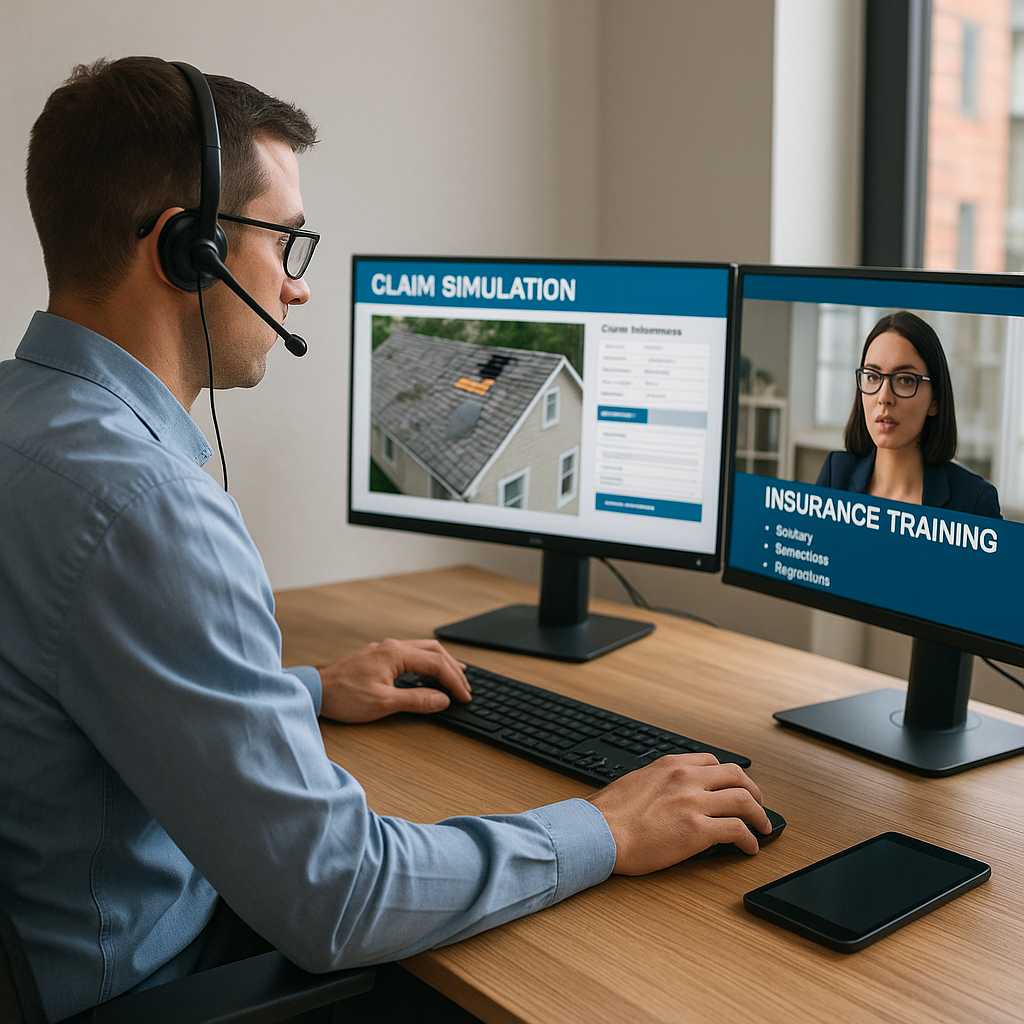In today’s rapidly evolving insurance industry, claims adjusters are increasingly called upon to manage complex scenarios that would have been rare just a few years ago. As technological advancements and shifting customer expectations reshape every corner of the field, insurance organizations are fundamentally rethinking how they train their adjusters to keep pace. Innovative insurance claim training courses now provide adjusters the flexibility and targeted learning they need to remain competitive. They blend interactive digital learning environments and self-directed coursework with live, hands-on opportunities for real-world expertise. This shift recognizes that today’s professionals often demand training solutions that can be integrated into busy schedules, without sacrificing rigor or practical value.
Within this dynamic landscape, the needs of insurers and policyholders are converging around the demand for efficient, precise, and customer-friendly claims management. This, in turn, underscores the critical importance of fostering a culture of continuous growth and adaptability among adjusters. Modern training programs are designed to do much more than cover technical foundations or the basics of insurance law; they are focused on nurturing analytical thinking, digital literacy, and strong communication skills—qualities imperative in a data-driven and client-oriented claims environment. Through comprehensive and up-to-date training initiatives, adjusters can keep abreast of increasing regulatory demands while gaining the tools to address policyholders’ needs empathetically and confidently.
Table of Contents
Embracing Technology in Training
The transformative power of technology is causing a foundational shift in how insurance professionals, particularly adjusters, are trained. Where once the classroom was the primary venue for learning, virtual classrooms and remote learning experiences are now available to provide unprecedented access to knowledge. In these online spaces, adjusters actively participate in interactive webinars, live group discussions, and break-out sessions that allow them to engage with instructors and their peers deeply. This format is flexible enough to serve a modern workforce that may be distributed regionally or globally. At the same time, digital libraries and instant access to resources mean adjusters can continually update their skills at their own pace.
One of this space’s most significant technological innovations comes from implementing real-time claims
simulation platforms and interactive tools that mimic true-to-life scenarios. These sophisticated digital simulations use actual case data to help trainees develop and sharpen analytical and decision-making skills, all within a risk-free virtual setting. In addition, adaptive AI modules play a growing role by monitoring a trainee’s progress, identifying areas for improvement, and offering customized feedback that accelerates mastery. This real-time customization tailors the trainee’s experience to their unique needs, enabling them to build the confidence and expertise necessary to tackle even the most complex claims challenges as they arise in real-world operations.
Additionally, incorporating advanced data analytics tools pushes training further, encouraging adjusters to master interpreting claims trends and proactively identify risk factors, including fraud detection. As insurance fraud schemes become increasingly sophisticated, these analytical and digital capabilities do more than just protect insurers—they proactively prevent costly errors and financial losses. Mobile learning apps and cloud-based platforms make it easy for adjusters to engage with training content or update documentation in real time, ensuring that new and experienced professionals can access the latest information, wherever they happen to be working.
Continuous Education and Certification
Today’s insurance sector is characterized by constant change, from new risk categories to the passage of complex legislation and ever-evolving regulatory practices. Keeping pace as an insurance adjuster requires a steadfast commitment to lifelong learning and regular skill upgrades. Top-tier training and industry certifications help establish a deep, durable grounding in essential insurance principles and pave the way for adjusters to advance their careers through specialization in high-demand areas such as catastrophe, property, or cyber claims. Well-designed courses are continuously updated to mirror the latest industry standards and regional regulations, ensuring every graduate remains competent and compliant.
Modern claims training also focuses heavily on cultivating adaptability and critical thinking. In a world where big data analytics and artificial intelligence tools fundamentally change the claims process, today’s adjusters must interpret complex information quickly, adapt to emerging technologies, and make more informed decisions under pressure. Communication skills are paramount as well, allowing for clear, compassionate conversations with policyholders, smooth collaboration with repair providers or medical experts, and enhanced teamwork among colleagues throughout the claims resolution process.
A core element in contemporary education involves digital ecosystem engagement. As online claims portals, virtual customer service chatbots, and social media become integral parts of the insurance experience, navigating and leveraging these channels for better customer servicing and faster claim resolution is essential. Practicing these skills through simulated interactions builds adjusters’ comfort and proficiency with digital communication, while also preparing them to offer customers streamlined, effective, and transparent support at every stage.
Hands-On Experience and Simulations
No amount of theoretical knowledge can replace the value of hands-on experience in the insurance sector. This is why leading-edge training programs emphasize authentic, real-life simulations that mirror the day-to-day responsibilities of an adjuster. Whether conducting policyholder interviews, site inspections, or negotiating settlements, these exercises allow trainees to hone the technical and interpersonal skills they will rely on in the field. Practical scenarios help refine adjusters’ judgment and reactions in high-pressure situations, providing safe opportunities for learning from mistakes before they impact real clients or claims.
The digital transformation of claims assessment has further accelerated this process. Machine learning algorithms and AI-powered assessment tools are now used to quickly gather, validate, and analyze vast amounts of claim information, streamlining much of the investigative legwork. These advancements result in faster, more accurate decision-making and allow insurers to allocate more resources to complex or sensitive cases. Automated workflows and digital documentation have significantly reduced time-intensive administrative work, freeing up adjusters’ time and enabling a much sharper focus on higher-value, customer-facing tasks.
Mobile technologies are another key driver of this new reality. Policyholders today expect quick, responsive digital service—including the ability to upload documentation and receive updates via smartphone. For adjusters, the ability to record statements, submit field notes, and synchronize evidence directly to central claims systems reduces errors and improves accuracy and turnaround time. This enhances client satisfaction and operational efficiency, giving insurers a distinct edge in a highly competitive marketplace.
Adapting to Regulatory Changes
As claims adjusters increasingly handle a wide array of scenarios, from standard auto accidents to complicated cyber risk disputes, the realities of the job are shaped as much by regulatory changes as by client needs. Staying compliant is not just a requirement—it’s an ongoing process that requires diligence and up-to-date knowledge. Training programs must remain agile and comprehensive to ensure continued compliance with frequent security law updates, evolving privacy requirements, and new products such as gig economy coverage coming to market.
The most effective training providers are committed to continually updating their content in response to legal and regulatory developments. This means adjusters are aware of changes to standards and best practices, consumer protections, and company protocols. This proactive educational approach helps reduce the risk of costly legal liabilities and penalties and enhances the public perception and credibility of insurance organizations. Adjusters become trusted consultants, guiding policyholders through ever-more-complex regulatory landscapes while also safeguarding their employer’s reputation and compliance status.
Customer-Centric Approach
A deep and growing commitment to a customer-centric mindset is at the core of all these training innovations. Rapid advancements in data analytics and digital user experience platforms have transformed how insurers understand and prioritize their customers’ needs. By strategically leveraging these technologies, insurance organizations develop more tailored products and streamline claims processes, giving every policyholder a more personalized and satisfying experience.
Modern customers expect speed, clarity, and transparency. As a result, adjusters trained in digital platforms can deliver robust self-service options, real-time progress updates, and instant communications that keep policyholders continually informed. These innovations empower busy customers and make the entire claims journey less stressful and more intuitive. Rapid, heartfelt responses from a knowledgeable adjuster can quickly turn a potentially harmful situation—such as a loss or accident—into a demonstration of exceptional service.
A final ingredient in this customer-centric future is feedback. Today’s leading insurers actively solicit and analyze direct input from policyholders, using that feedback to identify pain points, close coverage gaps, and develop innovative solutions that address real-world problems. In an industry where trust and reputation are everything, the ability to listen well and act on what is heard sets great companies apart.
Ultimately, customer-centricity has evolved from a competitive advantage into a baseline expectation. By building robust training programs that develop technical competence and the soft skills of empathy and communication, insurance organizations are equipping their adjusters to forge the loyalty and trust vital for success in a continually changing environment.




